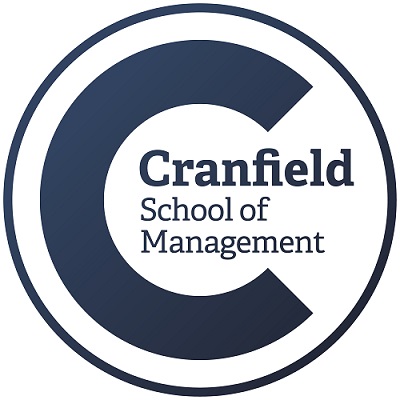- Learning
Executive Education in a Future World
Cranfield Executive Development’s Camilla Jonsson and Mark Threlfall in conversation
Now, facing a vastly different business environment and much changed ‘workplace’, the world is looking for a turbo-charged recovery that will be technology driven and green. For organizations and individuals to make this a reality; to harness technology, adapt to change, acquire the needed skills, and deliver this recovery, exemplary executive development will be critical.

“Great swathes of organizations are grappling with what to do with people whose skills will be replaced by AI automation,” says Mark Threlfall, Director of Cranfield Executive Development at Cranfield University. For Threlfall, these organizations need to assess the skillsets of their people and discover what is missing, in order to develop them into individuals that can work at the solutions level.

“It’s about shifting their focus from a deep, technical, narrow service provision into a much more integrated, wider offering for clients—shifting from product to solution.” Put another way, it is about “whole systems thinking,” says Camilla Jonsson, Portfolio Director at Cranfield. “This is how the individual executive becomes able to orientate in a bigger system.”
Cranfield School of Management, with its offer of leadership development, management courses, consultancy and technology-based solutions is uniquely well-placed to partner organizations and individuals undertaking this journey. The school is an integral part of Cranfield University—a postgraduate and research-based institution, historically associated with the aeronautics industry, and a world leader in science, engineering, and technology. Across the university much research is carried out, both on the future of work (the Management School hosts the Changing World of Work research group), and on many aspects of the green agenda—with numerous joint research projects, many sponsored by business.
Cranfield’s strength, as Jonsson sees it, lies in fostering “a crossover between technical expertise, and the organizational strategy that must be in place to make significant transformation for business in society.”
Cranfield Executive Development has for many years specialised in unlocking the leadership potential of people with technological expertise—financial, engineering, legal, etc. Of equal importance, and a key area of focus at Cranfield, has been the need to give generalist managers deeper insight into the demands of technology focused business. “Part of supporting our senior civil servants or SROs [senior responsible owners of projects],” says Jonsson, “is helping them know how not to get hoodwinked by their experts. Helping them to feel in control of whatever it is they're trying to do.”
In seeking to aid the post-pandemic recovery, as Threlfall emphasises, the school is looking to support the transition of the large numbers of senior people in industries affected both by the pandemic and the coming of AI. “How can we retrain these people?—because there are going to be lots made redundant. How can we support people to re-envisage what their next career will be, in their portfolio career? Our aim is to help highly skilled people with transferable skills—to realise those transferable skills, but also realise what is the shortfall they need to work on, and that their organization doesn’t have.”
The so-called ’rise of the generalist’ is another driving force here, with organizations looking to develop their people as able to work across the whole business and not be stuck in deep functional silos. Organizations increasingly need executives with flexibility, agility, a true understanding of the wider business, and the ability to operate beyond the very narrow focus of their particular expertise. “The AI agenda is key here too,” adds Jonsson, “because it's the human aspects of interpretation, judgement, sense-making—that future-proofs the organization in terms of skillsets.”
A New Form of Consultancy
For some time, Cranfield Executive Development has been developing a consultancy element to its client offering. The form of advisory consultancy they now practice, is not about rolling out a whole business process for an organization; rather it is about using the originators of relevant new research to work with organizations’ top teams to solve ‘wicked’ problems. “We don't have a set methodology,” says Threlfall. “We let the problem speak to us and we build the solutions.”
“We have deep subject matter expertise and research in seven key areas (aerospace, defence and security, energy and power, environment and agrifood, manufacturing, transport systems, water). We can align our offering around one or more of these key areas and build a solution—harnessing the intellectual horsepower behind them.”
This form of consultancy is built on ‘transferred capability’, and not around the creation of dependency, which is an argument against some consultancy models. “Done well, this methodology creates an environment where senior leaders working with strategic change issues can create an internal consultancy capability.” The potential impact of such a function, is of course massive.
Future Delivery
Before the COVID crisis there was always a requirement for blended learning. “The split was approximately 70% face-to- face, 30% remote,” notes Threlfall. “Now we are in a world that's completely digital, driven by the restrictions. When we go back to a blended model, I think it will flip to predominantly online, with no more than 30% face-to-face. Organizations are now used to saving on travel, so I don't think long periods of face-to-face will come back.”
The Cranfield team have been working on how to replicate immersive learning processes in the digital space, how to support a deeply transformational learning experience in a digital environment, when normally that requires a degree of disclosure, intimacy, and working together in small groups. A lot has been learned in the past few months and Jonsson reports that, “We are a long way down the line of being able to make very meaningful learning experiences, that address the need to keep the human connection and the human need for creativity.”
Learning Objectives for Future Leaders
One central objective is the call for executive education to provide ‘digital fluency’—the ability to use appropriate digital technologies effectively and creatively and then to lead confidently in a high-tech business world. Jonsson and Threlfall also see a movement in terms of leadership capabilities, away from competency driven requirements—“because those are a rear-view mirror, given the speed that things are shifting”—towards developing leaders at a “meta level”, to allow them to be more comfortable with emergence, to be more comfortable with ambiguity, having that fluency and that ease of operating as a leader when the lessons from yesterday cannot be applied.
Then as Jonsson points out, “At the opposite end of the spectrum, we see that the current young population, 20-24-year olds, are growing up with really low levels of social skills. Some people even at 24 are not comfortable speaking to adults—which has massive ramifications.” Developing human capital and leadership capability in this generation of ‘digital natives’ presents another learning challenge.
Another area for development comes from an increasing demand from clients—companies and individuals—for more ‘accredited’ learning. “We're seeing more and more clients wanting an exec ed offering with real credits that are portable, transferable, that learners can take with them in their portfolio,” says Threlfall.
Finally, linking back to Cranfield’s consultancy offer, Jonsson and Threlfall perceive a growing call for executive education providers to elevate their offerings, from merely providing content and programs, to really supporting organizational transformation in a sustained, long-term way. As Threlfall explains, “This requires the providers to be comfortable operating as partners at an ecosystem level, and offering a broader range of solutions, all the way from consultancy to short course programs and everywhere in between.”
For more information about Cranfield Executive Development click here
ARTICLES YOU MIGHT LIKE
VIEWPOINT
For Thomas Misslin, transformation rather than training is the aim of executive education at emlyon business school
DEVELOPING LEADERS QUARTERLY MAGAZINE AND WEEKLY BRIEFING EMAILS


































